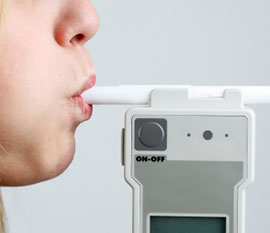
During a traffic stop, a police officer is trained to use procedures for detecting intoxicated motorists. The officer will follow a routine involving questions about the consumption of alcohol, and a series of sobriety tests.
The sobriety tests are conducted on the side of the road, usually in front of the squad vehicle. Police officers, lawyers, and judges refer to these sobriety tests as field sobriety tests because they are performed in the field (ie, the traffic stop).
The field sobriety tests (FSTs) generally involve standing on one leg and counting to 30, walking a straight line 9 steps out and back again, and following the officer’s pen with the eyes.
At every step of the process, questions and sobriety tests, the officer is developing the evidence against the driver. The questions elicit incriminating responses such as, ‘Yes, I had a few beers.’ And the sobriety tests indicate physical impairment, such as poor balance, that proves the person is intoxicated.
After the questioning and FSTs, the officer will ask the driver to submit to a breathalyzer test. The breath test is a hand-held device, called a portable breath test machine or preliminary breath test machine (PBT).
At this stage in the investigation, the driver has a choice to make: take the test or refuse. Most drivers are not informed that they can refuse without any penalty whatsoever. In fact, most probably believe there is a penalty for refusing the PBT, but that is not true.
A person’s driver’s license will not be suspended for refusing the PBT, or for blowing a 0.08 or more. The statutory summary suspension is based on the result of the breathalyzer at the police station.
Some drivers submit a breath sample for the PBT, and others refuse. The frequency is probably 50-50. Each has his own reasons, such as fear, surprise, ignorance, embarrassment, or cooperating with the officer for the sake of politeness. No one should be judged for deciding either way, because the stress and anxiety of the DUI stop is something no one is prepared for.
But the question arising after the traffic stop is,
‘Will the result of the PBT prove that I was over the limit?’
The answer is, no. The PBT is not admissible against the defendant in court to prove guilt.
A preliminary breath test is just that, preliminary. It is used by the officer to support his decision to arrest the defendant. The purpose of the PBT is to show probable cause for the arrest. If the driver’s breathalyzer result indicates an alcohol concentration of 0.08 or more, then the officer has probable cause to arrest. To be clear, the police officer does not need the PBT result in order to have probable cause, but a result of 0.08 or above always gives probable cause.
A PBT serves to protect the arrest for the prosecution if the defendant challenges probable cause. Basically, a defendant can ask the court to dismiss the charges on grounds that the police never had probable cause, and so the driver should not have been arrested in the first place.
This is the distinction with a PBT: it cannot be used to prove the defendant is guilty of the criminal offense of DUI, but it can be used to prove the officer had probable cause.
The officer cannot testify as to the result of the PBT in the trial because it is not admissible. However, in a hearing on probable cause, where the defendant is asserting he should have never been arrested in the first place, the officer is allowed to testify as to the result.
If the defendant files a motion to quash arrest and suppress evidence, or requests a hearing on a petition to rescind the statutory summary suspension, then probable cause will be an issue. The officer is allowed to disclose the result of the test in these hearings. But the evidence does not prove the defendant is guilty. Rather, it only shows probable cause.
Even if the prosecution prevails in these hearings, the defendant is still presumed innocent and entitled to a trial where the prosecution must prove the defendant guilty beyond a reasonable doubt. During that proceeding, the PBT is not admitted into evidence.

